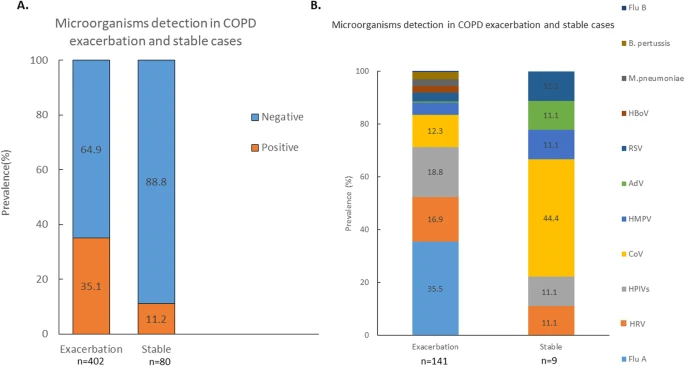Research – Open Access
Fanny Wai-san Ko, Paul Kay-sheung Chan, Renee W. Y. Chan, Ka-Pang Chan, April Ip, Angela Kwok, Jenny Chun-li Ngai, So-Shan Ng, Chan Tat On & David Shu-cheong Hui
Abstract
Background
Acute exacerbations of chronic obstructive pulmonary disease (AECOPD) and asthma are associated with a variety of precipitating factors including infection. This study assessed the infective viral etiologies by real-time multiplex polymerase chain reaction of patients hospitalized with AECOPD and asthma exacerbations. In addition, infective etiologies were assessed for association with the clinical outcome of the patients.
Methods
Adults admitted with AECOPD and asthma exacerbations between August 2016 and July 2017 were recruited. Nasopharyngeal aspirate (NPA) samples were obtained from the patients within 1–2 days of admission and subjected to pathogen detection and human rhinovirus (HRV) typing.
Results

Altogether 402 patients with AECOPD, 80 stable COPD, 100 asthma exacerbation and 21 stable asthma subjects were recruited. Among those admitted for AECOPD and asthma exacerbations, 141(35.1%) and 45(45.0%) respectively had pathogens identified in the NPA specimens. The commonest virus identified was influenza A followed by HRV. HRV typing identified HRV-A and HRV-C as the more common HRV with a wide variety of genotypes. Identification of pathogens in NPA or HRV typing otherwise did not affect clinical outcomes including the hospital length of stay, readmission rates and mortality except that identification of pathogens in asthma exacerbation was associated with a lower rate of readmissions at 30 and 60 days.
Conclusions
Many respiratory viruses were associated with AECOPD and asthma exacerbation. HRV-A and HRV-C were the more common HRV associated with exacerbations. Identification of pathogens in NPA was associated with less readmissions for asthma patients at 30 and 60 days.
